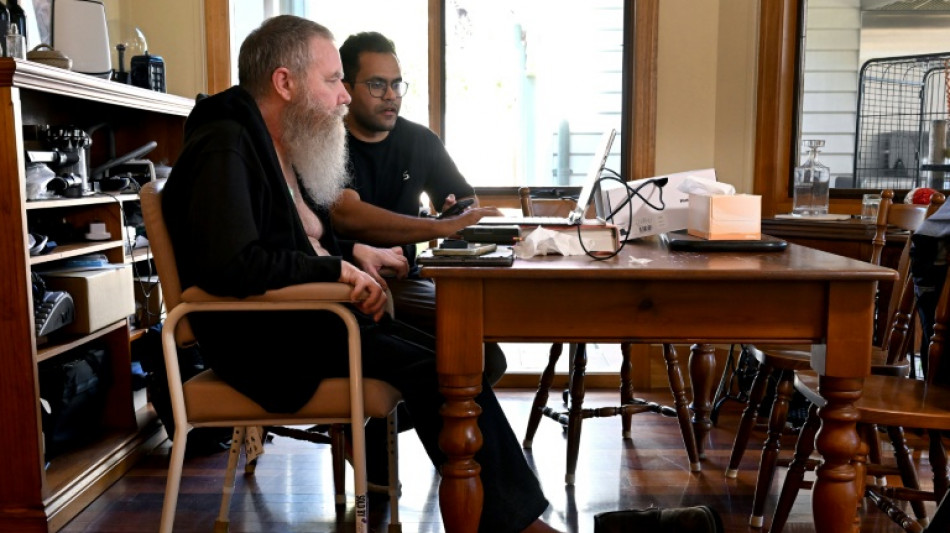
-
 Bangladesh launches campaigns for first post-Hasina elections
Bangladesh launches campaigns for first post-Hasina elections
-
Afghan resistance museum gets revamp under Taliban rule

-
 Multiple people missing in New Zealand landslips
Multiple people missing in New Zealand landslips
-
Sundance Film Festival hits Utah, one last time

-
 Philippines convicts journalist on terror charge called 'absurd'
Philippines convicts journalist on terror charge called 'absurd'
-
Anisimova grinds down Siniakova in 'crazy' Australian Open clash

-
 Djokovic rolls into Melbourne third round, Keys defence alive
Djokovic rolls into Melbourne third round, Keys defence alive
-
Vine, Narvaez take control after dominant Tour Down Under stage win

-
 Chile police arrest suspect over deadly wildfires
Chile police arrest suspect over deadly wildfires
-
Djokovic eases into Melbourne third round - with help from a tree

-
 Keys draws on champion mindset to make Australian Open third round
Keys draws on champion mindset to make Australian Open third round
-
Knicks halt losing streak with record 120-66 thrashing of Nets

-
 Philippine President Marcos hit with impeachment complaint
Philippine President Marcos hit with impeachment complaint
-
Trump to unveil 'Board of Peace' at Davos after Greenland backtrack

-
 Bitter-sweet as Pegula crushes doubles partner at Australian Open
Bitter-sweet as Pegula crushes doubles partner at Australian Open
-
Hong Kong starts security trial of Tiananmen vigil organisers

-
 Keys into Melbourne third round with Sinner, Djokovic primed
Keys into Melbourne third round with Sinner, Djokovic primed
-
Bangladesh launches campaigns for first post-Hasina polls

-
 Stocks track Wall St rally as Trump cools tariff threats in Davos
Stocks track Wall St rally as Trump cools tariff threats in Davos
-
South Korea's economy grew just 1% in 2025, lowest in five years

-
 Snowboard champ Hirano suffers fractures ahead of Olympics
Snowboard champ Hirano suffers fractures ahead of Olympics
-
'They poisoned us': grappling with deadly impact of nuclear testing

-
 Keys blows hot and cold before making Australian Open third round
Keys blows hot and cold before making Australian Open third round
-
Philippine journalist found guilty of terror financing

-
 Greenlanders doubtful over Trump resolution
Greenlanders doubtful over Trump resolution
-
Real Madrid top football rich list as Liverpool surge

-
 'One Battle After Another,' 'Sinners' tipped to top Oscar noms
'One Battle After Another,' 'Sinners' tipped to top Oscar noms
-
Higher heating costs add to US affordability crunch

-
 Eight stadiums to host 2027 Rugby World Cup matches in Australia
Eight stadiums to host 2027 Rugby World Cup matches in Australia
-
Plastics everywhere, and the myth that made it possible

-
 Interim Venezuela leader to visit US
Interim Venezuela leader to visit US
-
Australia holds day of mourning for Bondi Beach shooting victims

-
 Liverpool cruise as Bayern reach Champions League last 16
Liverpool cruise as Bayern reach Champions League last 16
-
Fermin Lopez brace leads Barca to win at Slavia Prague

-
 Newcastle pounce on PSV errors to boost Champions League last-16 bid
Newcastle pounce on PSV errors to boost Champions League last-16 bid
-
Fermin Lopez brace hands Barca win at Slavia Prague

-
 Kane double fires Bayern into Champions League last 16
Kane double fires Bayern into Champions League last 16
-
Newcastle pounce on PSV errors to close in on Champions League last 16

-
 In Davos speech, Trump repeatedly refers to Greenland as 'Iceland'
In Davos speech, Trump repeatedly refers to Greenland as 'Iceland'
-
Liverpool see off Marseille to close on Champions League last 16

-
 Caicedo strikes late as Chelsea end Pafos resistance
Caicedo strikes late as Chelsea end Pafos resistance
-
US Republicans begin push to hold Clintons in contempt over Epstein

-
 Trump says agreed 'framework' for US deal over Greenland
Trump says agreed 'framework' for US deal over Greenland
-
Algeria's Zidane and Belghali banned over Nigeria AFCON scuffle

-
 Iran says 3,117 killed during protests, activists fear 'far higher' toll
Iran says 3,117 killed during protests, activists fear 'far higher' toll
-
Atletico frustrated in Champions League draw at Galatasaray

-
 Israel says struck Syria-Lebanon border crossings used by Hezbollah
Israel says struck Syria-Lebanon border crossings used by Hezbollah
-
Snapchat settles to avoid social media addiction trial

-
 'Extreme cold': Winter storm forecast to slam huge expanse of US
'Extreme cold': Winter storm forecast to slam huge expanse of US
-
Jonathan Anderson reimagines aristocrats in second Dior Homme collection


ALS patient pioneering brain-computer connection
As a rare form of Lou Gehrig's disease paralyses his body, Rodney Gorham hopes a pioneering link between his brain and a computer will help others after he is gone.
The 63-year-old Australian shared his thoughts by using his eyes to pinpoint letters on a screen and "clicking" on words with his mind.
Thanks to an eight-millimetre stent implanted in his brain to detect neural activity, Gorham hopes to continue going online, sending messages and playing video games for a long time to come.
US company Synchron has been testing the "stentrode" for the past two years, getting cleared for human trials before Elon Musk's attention-grabbing Neuralink startup.
Gorham's implant connects to a small receiver and transmitter unit under the skin in his chest, and he credits it with changing his life.
Several years ago, Gorham was diagnosed with ALS, which causes progressive paralysis of the respiratory muscles, trunk, arms and legs.
The disorder is expected to gradually disable his movement, but not to kill him, according to his wife, Carolyn.
"So he could live for another 20 years. So think about if your body didn't move at all, your brain still firing at the same rate," she said.
"And you can't scratch your nose. You can't tell somebody you want to scratch your nose."
The brain implant gives her husband a "slice of life", letting him at least communicate or play a game, Carolyn Gorham added.
Rodney Gorham has given up on video games that require quick reactions typically made with handheld controllers or a computer mouse, but is still playing turn-based ones such as city-building games, according to his wife.
Without the experimental technology, the life of the sports car- and travel-loving former salesman "would be pure torture", Carolyn Gorham said.
- Language of the mind -
Synchron hopes to get approval next year from health authorities to market a final version of the device.
The startup said clinical tests have been conclusive but there is still a lot of work to do, notably in decoding brain signals and translating them into a universal language to command computers.
While eye-tracking tech enables a patient to target icons on a computer screen, the user must think of a motion -- like kicking their foot or making a fist -- to "click" an icon.
The software must be trained to recognise the brain signal that sends the command to the body, but people's minds "speak" in different ways.
Computers need a common neural language to understand the intent no matter who is thinking it, Synchron founder Tom Oxley said from his office in New York.
"That's a very interesting challenge we are facing now," Oxley told AFP.
"Building a system that is not just for one person, but for millions of people."
At his home in Melbourne, Rodney Gorham tells an AFP journalist that he was able to quickly learn to type using his mind.
While going through exercises to tune the software, he moves his feet as instructed. His hand moves an imaginary computer mouse on a tabletop.
At the start of the trial it took about two and a half seconds for Gorham's thoughts to prompt an on-screen click, but now it's a half second, Synchron engineer Zafar Faraz recalled while sitting next to the patient.
- Independence -
Gorham's contribution to improving the brain-computing interface has been "monumental", according to Faraz.
"I don't think we would be anywhere if he hadn't taken the brave step of volunteering and pioneering this technology," Faraz said.
Families of patients testing brain implants proudly compare them to astronauts bravely exploring a new world, said David Putrino, who oversees the stentrode's clinical testing in the United States and is director of rehabilitation innovation at New York's Mount Sinai Health System.
"We select patients who hope to advance science for others more than for themselves," Putrino told AFP.
The doctor sees implants like stentrodes improving overall health of patients whose conditions drastically limit social interaction, leaving them isolated.
"Recent studies show that solitude has the same effect on health as smoking 17 cigarettes a day," Putrino said.
The technology remains far from enabling real conversations, but it gives her husband much-needed autonomy, Carolyn Gorham said.
"Without the software... his life would be torture. I think that's the only way to describe it. It would be hell on earth.
"With this software the freedom that it will give him, just to be able to make decisions and look at things without asking somebody to do it for them. Just that little bit of independence is incredible."
L.Dubois--BTB



